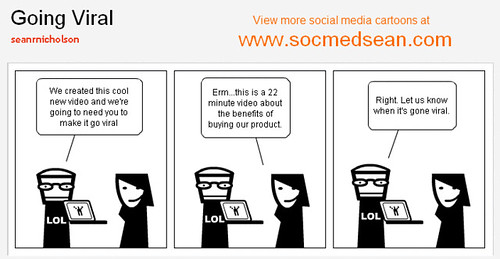The majority of corporate social media accounts languish in obscurity.
Maybe no one share their posts. Or they can’t get any engagement.
So they try posting more frequently, or using the latest tactic they read about on Mashable.
But they still struggle. And the results don’t get any better.
Because under the surface, there are road blocks in your social media strategy that are holding you back.
Here are 3 little-known reasons why no one shares your content.

Image courtesy of seanrnicholson
Reason #1: Your Raw Materials Aren’t “Shareable”
Most people will not want to share your commercial site, commercial message, commercial content, or commercial tool.
Nothing kills social media activity faster than a sales pitch. [Click to Tweet]
But you have to sell with social media at some point… you can’t just sit around and hope for the best.
So what are you supposed to do?
Corrective Strategy: You need to create “shareable” content to promote.
Every social media update should have an interesting hook that grabs attention and keeps your customers interested.
You have to “bait-the-hook” first, and then try to sell them later. This type of “shareable content” acts as the bait. And it usually embodies the following qualities:
- Insanely Useful / Utility: If it doesn’t provide some use or immense benefit then it probably won’t be interesting enough.
- “Evergreen” or Timeless: Don’t waste time chasing new stories or limited content. This should still be relevant for years to come.
- Branded: Branding your offering will make it unique, stand out from the others, and improve how people remember it.
- Promotable: Your idea, or content needs to be simple to spread. Not dumbed down. But really focused so it’s easy to understand.
For example, it’s hard to get people to engage with you or share your content in aggresive industries like insurance, real estate or other financial services.
So instead of promoting insurance policies, promote the lifestyle your customers have — or want to have. Change the positioning of your social media messages to match their worldview. (You’ll hear more about positioning in Reason #3 below).
The only reason for insurance is to protect against risks, and to give you peace-of-mind to focus on your family and career.
So talk about how risk-management fits into retirement planning, or how technology is affecting their careers.
Reason #2: There’s No Core Benefit
One of the best ways to get someone to engage, participate or share your content is by using incentives.
You reward people for taking action, and entice them to do more in the future.
It’s effective, and easy to do. But at the end of the day, people have to willingly want to share or engage if you’re going to have long-term success.
Corrective Strategy: Focus on your customers pain points, and position your content, social media updates and products/services as the solution.
Why should someone interact with you in the first place?
You could try humor, but it’s difficult to pull off online (especially if your legal department has you in hand-cuffs).
So the best way is to provide relief, or have an interesting angle that benefits the audience.
PayScale helps job candidates, employees, job seekers, and employers (HR) to compare their salaries across job titles, industries and locations. So basically they provide information, research and insight to business professionals and hiring managers.
They analyzed their data and created an infographic about how employers are using and managing social media for their employees.
Then they found bigger partners, like Mashable, to publish it. So far it’s received:
- 2,900 Tweets
- 999 Likes
- 1,700 LinkedIn shares
- And 901 Pins
It was successful because it was “shareable” (see reason #1), and interesting enough to spread – because people were spreading the story first.
Reason #3: You Have No Positioning or Value Proposition
How are you unique, interesting or different? (After all, only things that stand out get remembered).
Being “low-cost” doesn’t work. Everyone claims that, and few really are.
Being “better” doesn’t always work either. Someone will always be better than you at some specific aspect.
But this goes beyond taglines or slogans.
Your social media strategy should be an extension of this positioning.
Corrective Strategy: Stand for something and make more enemies.
Stone Brewery is the largest brewery in Southern California, and one of the biggest craft brewers in the country.
Last year they announced an expansion plan that includes (among other things), a 18.7 acre organic farm so they can use the best ingredients in their beer and restaurants, and a possible tourist hotel because so many people visit their brewery.
Stone believes in a certain way of doing business, and they aren’t afraid to voice their opinions.
They’re unabashedly against light, tasteless lagers (and the people who drink them). And as the scrappy up-start, they’re the complete opposite of the large, stuffy corporations in the industries.
The label on one of their most popular beers, Arrogant Bastard, warns people straight away:

Their social media accounts are no different. Each update is witty, interesting, and slightly arrogant in a funny-sarcastic way.
Sure, beer is an extremely “shareable” topic (see point #1). But you’d be hard pressed to find a more dedicated and engaged audience. And regardless of your taste in beer, you can’t deny Stone’s originality and bold positioning.
Their social media is just an extension of their brand. Which sounds obvious. But if it’s so simple, then why don’t most companies do it?
Most companies have no engagement, because people don’t care enough about them.
Even if you’re never heard of Stone Brewery before (and whether you agree or disagree with their philosophy), you already have an opinion.
And that’s the first step to getting people to talk about you. Or interacting and engaging with you in social media.


